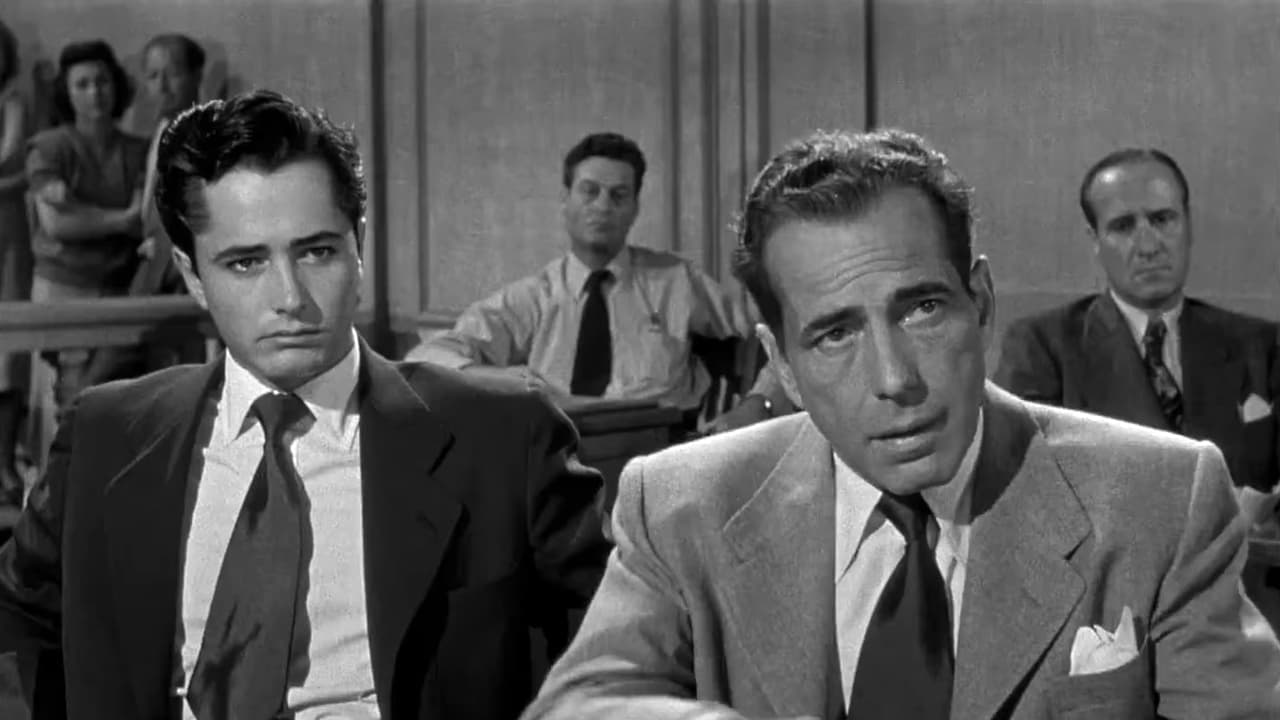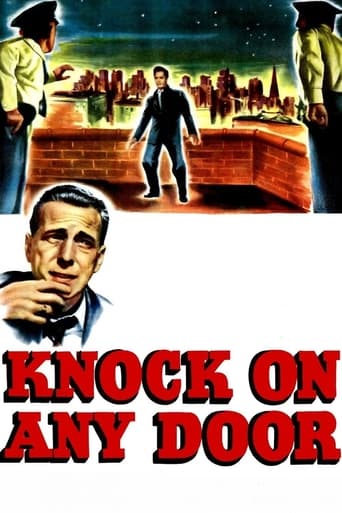

SERIOUSLY. This is what the crap Hollywood still puts out?
... View MoreIt's no definitive masterpiece but it's damn close.
... View MoreEasily the biggest piece of Right wing non sense propaganda I ever saw.
... View MoreThe story, direction, characters, and writing/dialogue is akin to taking a tranquilizer shot to the neck, but everything else was so well done.
... View MoreIf not for the inspired casting of George Macready as DA Kerman,I'd give this no more than 5/10.He's just absolutely smoking as the prosecutor.And if he'd been prosecutor in To Kill A Mockingbird,just imagine how that would've been.Pretty Boy Romano is a poor excuse for a man,and Morton,his atty wastes his time trying to get him off murdering a cop.He was given every opportunity to straighten up and fly right,but as usual,the world owed him an apology for his tough life.He seemed to come from an okay family,but he was bound to associate with the wrong type.Morton was his equal in youth,and you can imagine the kind of youth Atty Kerman had in comparison to Morton,but the two were worthy opponents,the difference being that the law was right,and no matter what Morton argued in Romano's defense,it was a lost cause.This really was Macready's film!
... View MoreThis is a terrific film I'd have given an 8 to if it hadn't nearly shot itself in the foot with Bogart's heavy-handed (but mercifully brief) "We're all guilty" summary to the jury.The prosecutor is played by the wonderful George Macready. Macready -- who in real life was a dear human being -- had a voice that suggested diabolic evil. Simply casting him as the prosecutor has us rooting for the defendant.Nicholas Ray's direction is generally brisk and focused, and there is a surprising amount of sharp humor during the trial.Many years ago, a prominent black-revolutionary leader observed that "wanting to be president of General Motors" was a sickness. We need a modern film that shows how the rich and powerful were corrupted into becoming people who achieved success at the expense of ruining thousands of ordinary people's lives.
... View MoreI wasn't expecting THEY LIVE BY NIGHT. I wasn't even expecting REBEL WITHOUT A CAUSE. But considering (or perhaps not even considering) the fact that the subject matter (juvenile delinquents, rebels, anti-conformity) was close to Nicholas Ray's heart, this is an unfortunately stale effort by one of the best and most important American film directors of the 20th century. Pretty Boy (a.k.a. Nick Romano, played by the perpetually puppy-dog eyed John Derek) grows up hardened and tough in a bad neighborhood on the Columbia Studios backlot. After years of jail terms and a stretch in a reform school, he returns home and falls for Pretty Girl (a.k.a. Emma, played to almost intoxicating sweetness by Allene Roberts). When he can't quit the life of crime, his pregnant wife commits suicide and Romano is put on trial for killing (or perhaps not killing) a cop. Most of his hardship is overseen by attorney Andrew Morton (Humphrey Bogart, the only lead actor who gives his role at least some intrigue and is therefore the only one who doesn't get the nickname treatment from yours truly), also from the wrong side of the tracks. He doesn't always quite believe that Romano is telling the truth and doesn't approve of his self-pitying ways (neither do I), but nonetheless he takes Romano's case and the battle is fought in the courtroom.I believe that films should stand on their own two feet and not be compared to previous works, but since Nicholas Ray was so clearly trying to recapture the magic of his astonishing debut THEY LIVE BY NIGHT, it's hard not to compare the two; after all the love story between Pretty Boy and Pretty Girl directly parallels Bowie and Keechie's relationship. Both stories involve two young adults from the wrong side of the tracks, a criminal hardened by his tough life and the angelic girl who he marries and briefly finds inner peace with. I never thought that anyone could give a bad performance under Ray's direction, but while Farley Granger was no Montgomery Clift, John Derek is a dime-store version of Granger; at least Granger was able to give a sensitive and genuinely compelling performance under Ray's fatherly direction. Derek goes through the motions but not the emotions that Granger did so effortlessly. And even the ethereal Cathy O'Donnell was smart enough to allude to the toughness earned from years of living in the wrong place; Allenne Roberts captures none of that, only the unbelievable angelic nature. These characters don't echo the complexity of Ray's debut; they are whiny caricatures of people we're supposed to feel sorry for.It's admirable that Humphrey Bogart would want to make a film about social injustice for his first project as a producer (this film was financed by his independent production company Santana), and he even lets most of the light shine on Pretty Boy. However, given Derek's poor performance and Bogart's coy cynicism, his golden integrity just hidden beneath the surface, and his brooding on-screen presence (as preachy as his closing argument is, it is well acted by Bogart), I wished the movie had been more about him, I wished the script not been as black-and-white as Burnett Guffey's cinematography. In trying to cry out for justice, the film just annoyed me with its condescending attitude and simplified message my six-year-old cousin could've caught. I recommend two Nicholas Ray films that are a much more stimulating and thought- provoking experience: the first is THEY LIVE BY NIGHT for reasons already stated. The second is his masterful IN A LONELY PLACE, his second film with Humphrey Bogart--and in this one he *is* in the center stage, featuring probably the most complex and darkest role of his career. I guess one good thing came out of KNOCK ON ANY DOOR: Bogart and Ray, who came from different ways of approaching their jobs, needed one film to get to know each other, how the other one worked. Ray once said that during this film he "took the gun away from Bogart's hands," and by the time they re-teamed for the second and last time, their professional relationship had ripened to friendship. Bogart trusted Ray enough to give a nakedly vulnerable performance in a film which you *SHOULD* look into.
... View MoreThis is the first movie which is Rayesque to the core.One of his most obvious permanent feature really appears for the first time: the search for a father.The relationship Bogart/Derek is intense (after the death of the biological one)and predates those of "Run for cover" (John Derek again playing opposite Cagney) and "Rebel without a cause " (Remember Plato to Jim and Judy: "I wish you could be my parents" )But I could also mention the Mitchum/Kennedy relationship in " lusty men" or even Heston and the Chinese girl in "55 days at Peking" .Or James Mason and his (biological this time) in "bigger than life".Emma's character predates The Rayesque young girl ,the one you meet again in "they live by night" (note how Allene Roberts resembles Cathy O'Donnell).Allene Roberts' beaming face and her hope against hope are the only ray of light in a dark tragical story.Like Fritz Lang,Nicholas Ray put the blame on the society.Nick was born under a bad sign ,like many of the director's heroes.John Derek gives an intense performance climaxing in the scene in the court when his wife's suicide is revealed.Bogart shines as his lawyer (he's more convincing in this kind of part than he was in "marked woman").Excellent screenplay with a superb editing ;many contemporary movies (such as the brilliant "Usual suspects" ) might have been influenced by the first scenes.Note that the story begins during the cast and credits ,which shows that Ray ,when he was on top of his game,did not know filler.
... View More